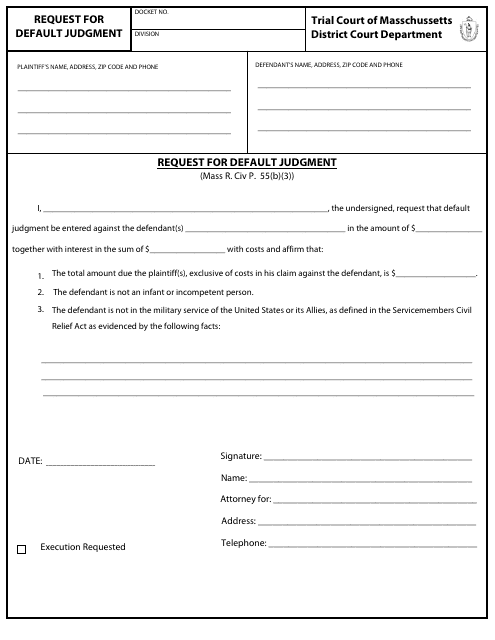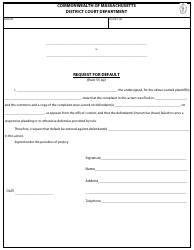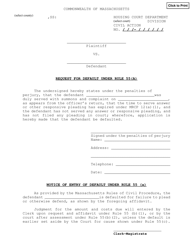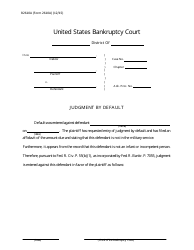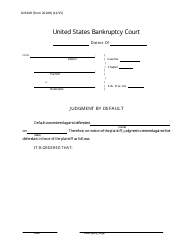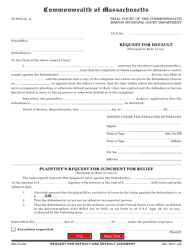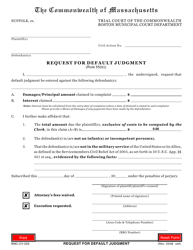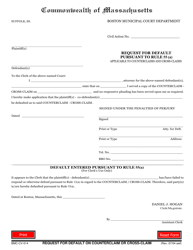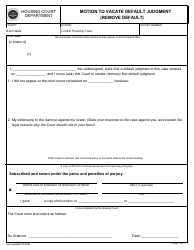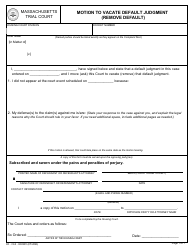Request for Default Judgment - Massachusetts
Request for Default Judgment is a legal document that was released by the Massachusetts District Court - a government authority operating within Massachusetts.
FAQ
Q: What is a Request for Default Judgment?
A: A Request for Default Judgment is a legal document filed by the plaintiff in a lawsuit when the defendant fails to respond or participate in the case.
Q: What is the purpose of filing a Request for Default Judgment?
A: The purpose of filing a Request for Default Judgment is to ask the court to enter a judgment in the plaintiff's favor because the defendant has failed to respond or participate in the lawsuit.
Q: How can a plaintiff file a Request for Default Judgment in Massachusetts?
A: A plaintiff can file a Request for Default Judgment in Massachusetts by submitting the necessary documents to the court, along with any required fees.
Q: What happens after a plaintiff files a Request for Default Judgment?
A: After a plaintiff files a Request for Default Judgment, the court will review the documents and may enter a judgment in the plaintiff's favor if the defendant has failed to respond or participate in the case.
Q: Can a defendant oppose a Request for Default Judgment?
A: Yes, a defendant can oppose a Request for Default Judgment by filing a motion to set aside the default or by showing good cause for their failure to respond or participate in the case.
Q: What are the potential outcomes of a Request for Default Judgment?
A: The potential outcomes of a Request for Default Judgment include the court entering a judgment in the plaintiff's favor and awarding damages or other relief requested, or the court denying the request if the defendant successfully opposes it.
Q: Is a Request for Default Judgment final?
A: A Request for Default Judgment can be final if the court enters a judgment in the plaintiff's favor and the defendant does not successfully challenge it. However, the judgment may be set aside or modified if the defendant successfully opposes the request.
Q: What should a defendant do if they receive a Request for Default Judgment?
A: If a defendant receives a Request for Default Judgment, they should consult with an attorney as soon as possible to understand their options and how to respond to the request.
Q: Are there any time limits for filing a Request for Default Judgment in Massachusetts?
A: Yes, there are specific time limits for filing a Request for Default Judgment in Massachusetts. It is important to consult the relevant laws and rules of civil procedure or seek legal advice to ensure compliance with these time limits.
Q: Can a Request for Default Judgment be appealed?
A: Yes, a Request for Default Judgment can be appealed if the defendant believes there were errors in the process or the judgment was not justified. It is important to consult with an attorney to understand the appellate process and deadlines.
Form Details:
- The latest edition currently provided by the Massachusetts District Court;
- Ready to use and print;
- Easy to customize;
- Compatible with most PDF-viewing applications;
- Fill out the form in our online filing application.
Download a fillable version of the form by clicking the link below or browse more documents and templates provided by the Massachusetts District Court.
